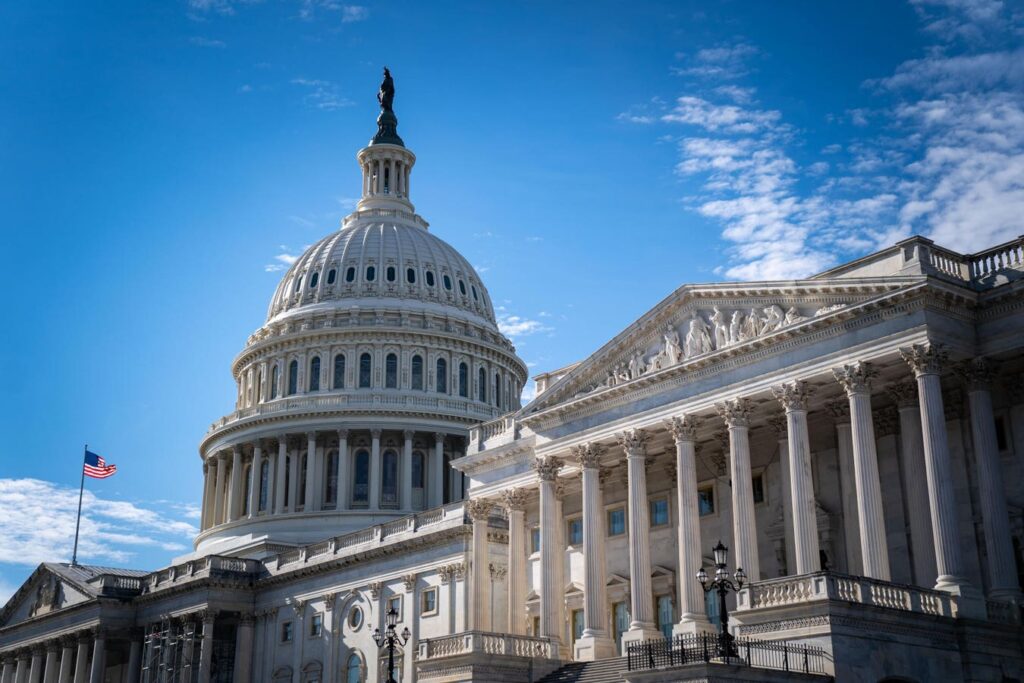WASHINGTON, DC – NOVEMBER 16: The Senate and the Dome of the U.S. Capitol Building is seen on … More
It is time to repeal the half-century old Budget and Impoundment Control Act, which structures the way Congress writes its fiscal plans.
Some elements of the ’74 Act are worth preserving. The Congressional Budget Office was an essential invention, despite the criticism it currently faces. And Congress needs a mechanism to maintain a balance of fiscal power with the executive branch, even if it has been ceding much of that authority recently.
But the ’74 law not only has failed to slow spending and tax cuts, it has enabled them. Because Congress has so distorted the law, deficits likely are vastly worse than they would have been without it.
The 1974 act was written to accomplish two goals: Centralizing the process of budget-making and curbing the ability of the president to impound, or refuse to spend, money that Congress appropriates. The overall idea was to give Capitol Hill the tools it needed to be fiscally responsible and help Congress retake control of the federal purse strings.
Unfortunately, in recent years, the budget act has failed spectacularly.
The Track Record
In 1974, the federal deficit was less than a rounding error today, about $6 billion or 0.4 percent of Gross Domestic Product. The public debt was about $344 billion, or 23 percent of the economy.
By 2024, the annual deficit had ballooned to $1.8 trillion, or 6.4 percent of GDP. And the public debt exploded to $28 trillion, equal to nearly 100 percent of GDP.
Federal debt as a share of the economy
Of course, the law didn’t do this. Congress did. But it is fair to say it would not have happened without the ‘74 law – largely because lawmakers, often responding to their voters, gradually turned the act on its head.
The law was intended to create a strict legislative process to approve tax cuts and most spending. It established budget committees to set overall tax and spending targets and enforce fiscal discipline, and it created the Congressional Budget Office to not only track the fiscal consequences of legislation but make them transparent.
In what has become the most significant change, Congress adopted the complex process known as reconciliation that made it possible for the Senate to pass budgets with a simple majority rather than the 60 votes that has become standard.
Turning The Process Inside-Out
But almost none of it has worked out as expected.
The budget committees have become increasingly passive and controlled by party leadership, and it has been years since they’ve spoken out against fiscal irresponsibility. The anti-impoundment language is routinely ignored by President Trump., the overall spending targets are months late or never agreed to at all, and the lawmakers often pass fiscal bills without even waiting for a CBO score.
Worst of all, Congress has turned the reconciliation process inside-out. What was designed to make it easier for the Senate to cut spending and raise taxes instead has become a vehicle to do exactly the opposite. And it has further entrenched the bitter partisanship that not only has infected Washington but led to bigger and bigger deficits.
The Results
Budget-busting bills like President Bush’s 2001 and 2003 tax cuts, which ended a brief era of fiscal surplus; the 2017 Tax Cuts and Jobs Act; the 2021 American Rescue Plan Act; the 2022 Inflation Reduction Act, and other big, highly partisan fiscal measures never would have become law without the reconciliation process created by the ’74 Act. None of those bills received the 60 votes ordinarily needed to pass the Senate and only one received more than 51.
And soon a huge 2025 budget bill will add trillions of dollars more to deficits in the same way, aided by a law that was supposed to limit the flow of red ink.
Congress had better luck using the ’74 Act to block presidents from refusing to spend money it approved – until this year when Trump repeatedly challenged Congress’s power of the purse by abolishing or restructuring entire agencies and by withholding funds for legislated initiatives throughout government.
The biggest change to the law was passage of the Byrd Rule in 1985, which, among other things, limited lawmakers’ ability to add to deficits after a decade.
Unfortunately, that only encouraged Congress to use more gimmicks aimed at making budgets look like they don’t increase future deficits, when in fact they do. For instance, the House’s just-passed budget bill phases out tax cuts on paper, even though lawmakers are widely expected to extend them.
A Matter Of Will, Not Process
Thirty-five years ago, Rudy Penner, a former CBO director and my former colleague at TPC, warned the Budget Act and subsequent changes created “a process that appears orderly on paper [but] has now led to extremely disorderly and dishonest results.”
In 2015, Lou Fisher, a long-time congressional staffer who helped write both the 1974 law and many efforts to fix it, wrote, “Accountability of elected officials, instead of being strengthened, declined.”
Fortunately, there are alternatives. Brookings Institution scholar Phillip Joyce has some good suggestions here. If Congress ever works up the courage to tackle the deficit, reforms such as these may be helpful. But the lesson of the ’74 Act is clear: Absent congressional will, lawmakers inevitably will find ways to manipulate their own rules to make deficits even worse.
Read the full article here
